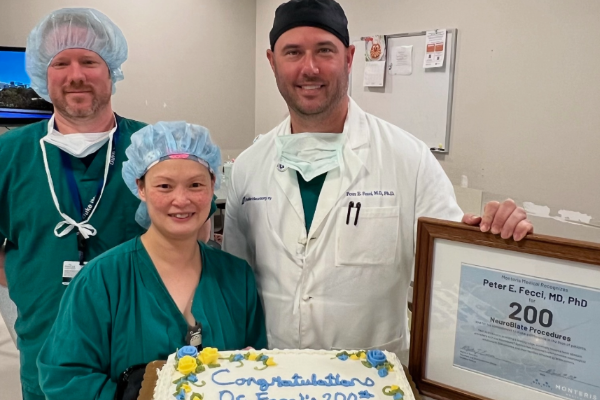Celebrating 200 (plus!) Cases
In March 2024 Peter Fecci, MD, PhD and team were celebrated for reaching the 200-case milestone for laser interstitial thermal therapy (LITT).*
LITT is a minimally invasive surgical technique that uses a small laser to destroy unhealthy brain tissue. It can be an effective treatment option for recurrent brain tumors, radiation necrosis, and tumors that form deep within the brain. It is also used to treat certain types of epilepsy.
LITT provides the benefits of traditional brain surgery with less risk and a shorter recovery time. Because the procedure is minimally invasive, it is especially appropriate for patients who have undergone prior surgery or radiation or have a health condition that increases risks associated with traditional brain surgery.
Fecci is professor of neurosurgery and director of the Duke Center for Brain and Spine Metastasis. He was an early adopter of the new technology, and has some of the most experience of any surgeon; Duke is among the top institutions for the number of LITT procedures performed each year in the U.S

*As of the end of 2024, Duke neurosurgeons have performed 277 LITT procedures, with Fecci completing 230 of those.
Duke Champions Greater Awareness for Brain and Spine Metastasis

In 2024, the Duke Center for Brain and Spine Metastasis (DCBSM) partnered with Duke Neurosurgery, the American Brain Tumor Association, the Society for Neuro-Oncology, and Duke Health Government Relations to champion the call for an official Brain and Spine Metastasis Awareness month, filling a need for wider understanding of this disease by providers and the general public alike.
Individuals who develop brain and spine metastasis not only frequently face a poor prognosis but may also face poor provider understanding of the treatment options and resources that are truly available. These patients report feeling unseen and uninformed, and they find appropriate treatment options to be limited or even unavailable.
Rep. Valerie Foushee (NC-04) introduced a resolution to Congress recognizing June as Brain and Spine Metastasis Awareness Month. Thirty-three organizations nationwide have signed on in support. A ribbon was created by DCBSM staff to be a symbol of the effort and a purposeful visual reminder of the facets of brain and spine metastasis and the effort was presented at SNO/ASCO CNS Metastases in Denver, Colorado.
Gender, Survival, and Outcomes for Spine Metastases Patients
Gender may be a prognostic factor in survival and clinical outcomes for patients undergoing treatment for spine metastases. This is the finding of a retrospective review by neurosurgeon scientist Rory Goodwin, MD, PhD, and collaborators. Goodwin is spine services director of the Duke Center for Brain and Spine Metastasis.
The Study
An international, multi-center study investigated patient demographic data, overall survival, treatment details, perioperative complications, and health-related quality of life (HRQoL) measures. Researchers arranged patients by sex and then conducted a separate sensitivity analysis to exclude gender-specific cancers like breast and prostate cancer.
Findings
“Both males and females experienced significantly improved HRQoL scores after treatment, but females demonstrated longer survival and had a lower complication rate,” the authors wrote, adding that gender should be taken into consideration accordingly when counseling patients.
The study cohorts included 207 female and 108 male patients. Age, smoking status, and site of primary cancer were significantly different between the two.
The HRQoL scores from quality-of-life measures, such as EQ-5D, pain NRS, the short form 36 version 2 (SF-36v2), and the Spine Oncology Study Group Outcomes Questionnaire (SOSGOQ) were significantly improved in both males and females. However, under the sensitivity analysis, the improvements in SOSGOQ physical, mental, and social subdomains and SF-36 disappeared for females.
Year in Review Chapters
HOME / BRAIN TUMOR / CEREBROVASCULAR AND SKULL BASE / FUNCTIONAL / SPINE / PEDIATRIC / BRAIN AND SPINE METASTASIS / TRAUMA / GLOBAL / TOP PAPERS / RESIDENT HONORS